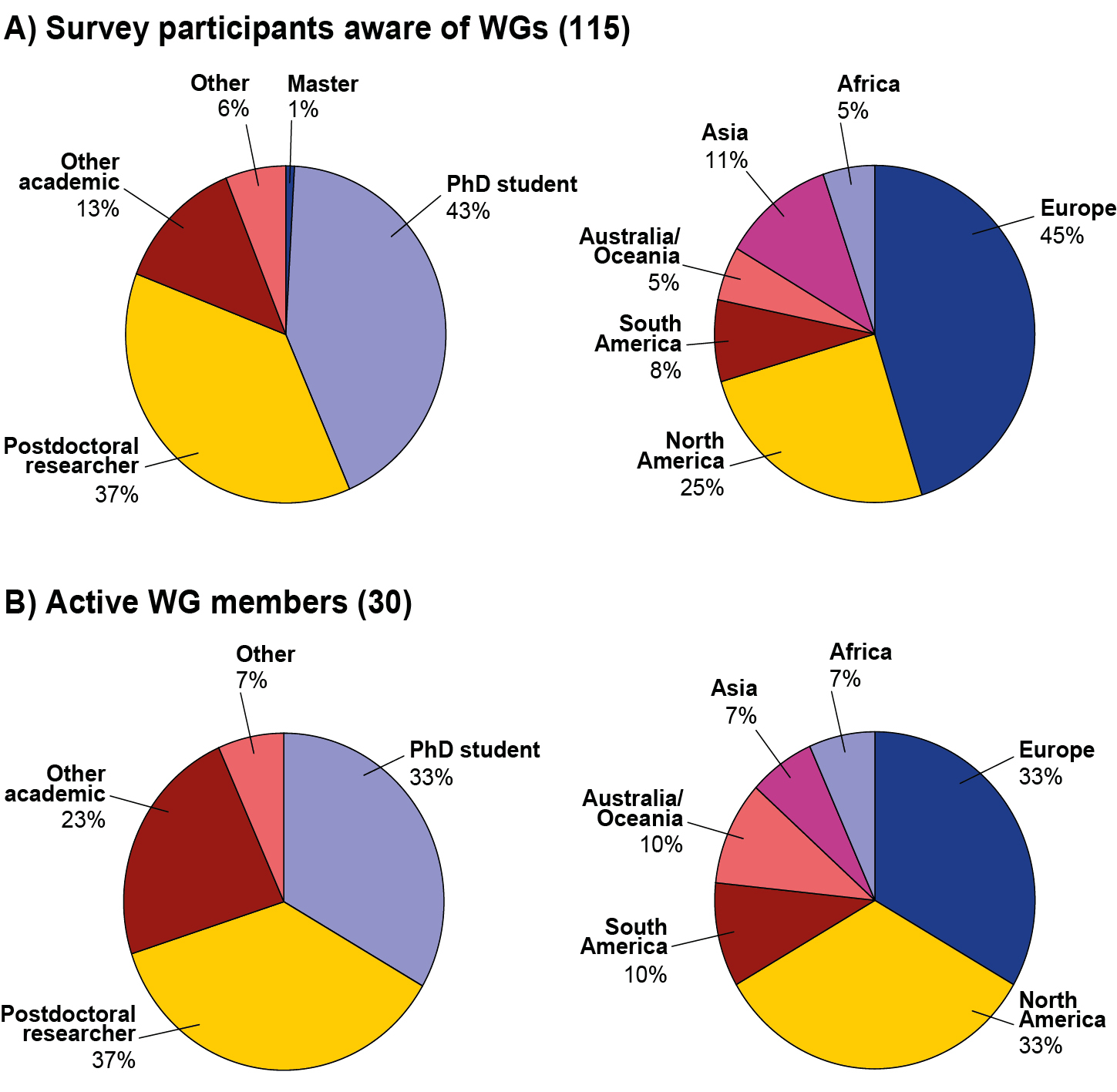- Home
- Publications
- PAGES Magazine
- Early-career Researchers' Perceptions of PAGES Working Groups
Early-career researchers' perceptions of PAGES working groups
Ryan DD, Alexandroff SJ, Lechleitner FA, Schafstall N, Trofimova T & Detlef H
Past Global Changes Magazine
28(2)
64
2020
Deirdre D. Ryan1, S.J. Alexandroff1,2, F.A. Lechleitner3, N. Schafstall4, T. Trofimova5 and H. Detlef6
In January 2020, a survey was sent to PAGES early-career researchers (ECRs) to assess their understanding of PAGES' structure, awareness of support offered by the PAGES Early-Career Network (ECN; pastglobalchanges.org/ecn), and the involvement of ECRs in working groups (WGs). The latter assessment serves as an important baseline metric for active efforts by PAGES to improve ECR involvement in WGs.
The survey was developed by this article's authors and spearheaded by Dr. Henrieka Detlef. PAGES members who identified as ECR on their member profiles and those subscribed to the ECN mailing list were emailed survey requests. Recognizing there may be some overlap, this totalled 653 PAGES members. We received 123 responses (~19%); however, eight of the survey participants had no awareness of WGs, so the results presented here are based upon the responses of the remaining 115 individuals (Fig. 1). The survey results are not considered representative of all PAGES ECRs.
Half of the respondents (51%, 59 of 115) are subscribed to at least one WG mailing list, but only 26% (30) consider themselves to be an active or contributing member to at least one WG. Most active members (98%) consider WG involvement beneficial to their career. The majority of active members are either postdoctoral researchers or PhD students located in Europe or North America, followed by South America and Australia/Oceania, and then Africa and Asia. Involvement in WGs is most commonly initiated through attendance at a WG workshop and/or through a supervisor. We were unable to assess the representation of ECRs within WGs as records of membership are not maintained by WGs.
The survey helped to identify hurdles for ECR involvement in WGs. A large percentage (71%) of respondents, who were aware of WGs and/or subscribed to a WG mailing list, have never approached a WG regarding membership. Barriers to ECR involvement in WGs included not knowing how to join a working group, the impression that they have nothing to offer or that they may not be welcome to join a WG, and a lack of any WG that fits their research. Four survey participants who did approach WGs for membership were unsuccessful due to a lack of positive response from the WG.
Survey participants were also asked to provide suggestions on how to facilitate the inclusion and involvement of ECRs in WGs. The most repeated suggestion was more funding to cover travel costs. Other responses were:
• An annual open call by WGs for new membership;
• Active efforts by WG members to invite ECRs and involve ECRs in new projects;
• Virtual options for all WG meetings and workshops;
• A mentoring program with senior scientists who are willing to provide support to ECRs from disadvantaged backgrounds or whose supervisors are not active within PAGES.
Other efforts to enhance ECR involvement are already underway. Since 2018, every WG has been required to appoint an ECR as liaison to the PAGES ECN. New WGs are encouraged to include ECRs in the steering group and highlight their participation in the proposal. Workshop funding is primarily reserved for the support of participating ECRs. In addition, the PAGES ECN has started a science cluster which aims to connect ECRs who want to start new WGs or collaborate on other scientific projects. Finally, a webinar series is slated to begin before the end of 2020 that will focus on how ECRs can engage in existing WGs. Announcements will be made on the PAGES ECN website and in the PAGES e-news as these activities develop.
affiliations
1MARUM – Center for Marine Environmental Sciences, University of Bremen, Germany
2College of Life and Environmental Sciences, University of Exeter, UK
3Department of Chemistry and Biochemistry and Oeschger Centre for Climate Change Research, University of Bern, Switzerland
4Czech University of Life Sciences, Faculty of Forestry and Wood Science, Department of Forest Ecology, Prague, Czech Republic
5NORCE Norwegian Research Centre, Bjerknes Centre for Climate Research, Bergen, Norway
6Department of Geoscience, Aarhus University, Denmark
contact
Henrieka Detlef: henrieka.detlef geo.au.dk
geo.au.dk

